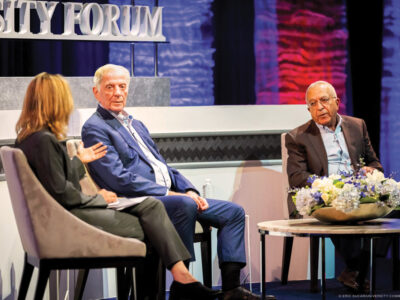
Penn has joined the ranks of prominent universities protesting the killing of hundreds of thousands of civilians in Sudan by barring future investment in companies that economically support it.
“The genocide occurring in the Darfur region with the support of the Sudanese government represents a moral evil that we cannot ignore,” said Penn President Amy Gutmann after the trustees voted to divest in late June.
The new investment policy, which covers seven major oil and construction companies with links to the country, doesn’t affect any of Penn’s current holdings. But it “sends the signal to other academic institutions that this is something that’s important to Penn, and we want to take a lead on this,” says Wharton senior Brett Thalmann, 2006-07 chair of the Undergraduate Assembly (UA), one of three campus groups whose advocacy prompted the University to take action. Students Taking Action Now: Darfur (STAND) and the Social Responsibility Advisory Committee of University Council also called for divestment.
The growing list of higher-education institutions with some sort of divestment policy includes, among the Ivies, Harvard, Princeton, Yale, Dartmouth, and Brown.
“I think universities are pioneers in drawing attention to this issue,” says Craig Carnaroli W’85, Penn’s executive vice president. “There has been a failure among world leaders to address this in a timely manner.
“Divestment is a very rare issue,” he adds, “and part of the criteria we have around these kinds of decisions is that we look for a broad consensus in the community, which existed on this issue, as well as a true moral evil occurring out of the actions of these companies in terms of their contributions to the Sudanese economy.”
Samir Sonti, a Penn sophomore majoring in political science and economics, was active on the Darfur issue at his high school in State College, Pennsylvania, and wasted no time getting involved in STAND when he came to Penn last year. “I thought [divestment] was a great way to make a splash in the media … and send the message that [the genocide] needs to be addressed more than it has been,” he says.
Sonti was pleasantly surprised by the reception his group received from Penn’s administration. “I had the impression that once we got going they were kind of going to brush us aside, but they made an effort to hear what we had to say,” he says.
Their cause was boosted by the 1,000 student signatures they collected over five days on Locust Walk. “Penn students are probably more aware than the average American sample [about the genocide], but not as aware as we would like them to be,” he says. “Once you start talking about it, [awareness] spreads pretty quickly. The message is getting out there, I think.”
Carnaroli says he was impressed by the students’ approach. “They were very focused when I met with them—not ‘Let’s do it because everyone else is doing it.’ They worked through the internal process to get it done, and they brought the University community together discussing this.” They also “put on suits and ties and presented themselves in a very serious way,” he says.
An article in the Chronicle of Higher Education noted the professional tone of the current student divestment movement—one characterized more by research reports than rallies, and compromise rather than confrontation.
“I feel like the campaign represents a new wave of student activism,” UCLA senior Adam Sterling told the Chronicle. “We have the research and the know-how, and we’ve been able to utilize the national press … We found ourselves giving reports to colleges across the country and being taken seriously as an organization—as equal players with presidents and investment staffs.”
Daniel Millenson, a sophomore at Brandeis University, added that a moderate approach to divestment that targets “the worst offenders” is “more effective because it’s less likely to hurt an endowment.”
In addition to the students, faculty, staff, and alumni were represented in Penn’s divestment decision as members of the University Council’s Social Responsibility Advisory Committee, which identified seven major companies that Penn should exclude from its direct investments: PetroChina, Sinopec, Oil & Natural Gas Company, Nam Fatt, Bentini, Higleig, and Hi-Tech Petroleum.
“Genocide is a horrific act, and the University must in its investments reflect the principles we teach in our classrooms and try to instill in our students,” says committee chair Jerry Porter, a mathematics professor.
Though the effectiveness of divestment remains to be seen, Porter says, “One hopes that it can help to end the genocide. Each of us by ourselves has very little power, but joined together in a group, our power is increased enormously.”
“Universities alone are probably not going to have the impact that we’d like to see,” adds Carnaroli, “but I hope we’ll be drawing enough attention and awareness that we’ll see the [level of] impact that higher education had on issues like apartheid.”
Sonti, meanwhile, sees the work of his group as just beginning: “We want to look into more details and get a more comprehensive divestment commitment” from Penn.—S.F.




